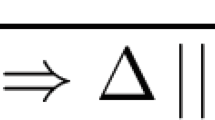Abstract
Pure type systems arise as a generalisation of simply typed lambda calculus. The contemporary development of mathematics has renewed the interest in type theories, as they are not just the object of mere historical research, but have an active role in the development of computational science and core mathematics. It is worth exploring some of them in depth, particularly predicative Martin-Löf’s intuitionistic type theory and impredicative Coquand’s calculus of constructions. The logical and philosophical differences and similarities between them will be studied, showing the relationship between these type theories and other fields of logic.

Similar content being viewed by others
References
Asperti A, Longo G (1991) Categories, types, and structures: an introduction to category theory for the working computer scientist. MIT Press, Cambridge, MA
Barendregt HP (1991) Introduction to generalized type systems. J Funct Program 1(2):125–154
Barendregt HP (1993) Lambda calculi with types. In: Abramsky S, Gabbay DM, Maibaum TSE (eds) Handbook of logic in computer science, vol 2. Oxford University Press, New York
Bell JL (1986) From absolute to local mathematics. Synthese 69(3):409–426
Church A (1940) A formulation of the simple theory of types. J Symb Logic 5:56–68
Church A (1941) The calculi of lambda-conversion. Ser Ann Math Stud 6
Coquand T (1986) An analysis of Girard’s paradox. In: Proceedings of the IEEE symposium on logic in computer science, pp 227–236
Eilenberg S, MacLane S (1945) General theory of natural equivalences. Trans Am Math Soc 58(2):231–294
Girard JY (1972) Interpretation fonctionelle et eleimination des coupures dans l’arithmetique d’ordre superieure. PhD thesis, Université Paris 7
Granström JG (2011) Treatise on intuitionistic type theory. Springer, Berlin
Jacobs B (1999) Categorical logic and type theory, vol 141. Elsevier, Amsterdam
Johnstone PT (2003) Sketches of an elephant: a topos theory compendium-2 volume set. In: Sketches of an elephant: a topos theory compendium-2 volume set, p 1
Lambek L (1972) Deductive systems and categories III. Cartesian closed categories, intuitionist propositional calculus, and combinatory logic. In: Toposes, algebraic geometry and logic. Springer, Berlin, pp 57–82
Lambek J, Scott PJ (1988) Introduction to higher-order categorical logic, vol 7. Cambridge University Press, Cambridge, MA
Landin PJ (1965) A correspondence between ALGOL 60 and Church’s lambda-notation: Part I. Commun ACM 8(2):89–101
Lawvere FW (1963) Functorial semantics of algebraic theories. Proc Natl Acad Sci USA 50(5):869
Martin-Löf P (1975) An intuitionistic theory of types: predicative part. In: Logic colloquium ’73, pp 73–118
Palmgren E (1998) On universes in type theory. In: Sambin G, Smith J (eds) Twenty-five years of constructive type theory, Oxford University Press
Peruzzi A (1991) Categories and logic. In: Problemi fondazionali nella teoria del significato, pp 137–211
Ramsey FP (1978) Foundations: Essays in philosophy, logic, mathematics and economics.In: DH Mellor, Routledge & Kegan Paul
Reinhold M (1989) Typechecking is undecidable when ‘type’ is a type. Technical report, Massachusets Institute of Technology
Reynolds JC (1974) Towards a theory of type structure. In: Programming symposium. Springer, Berlin, pp 408–425
Roorda J-W (2000) Pure type systems for functional programming. Master’s thesis, University of Utrecht
Russell B (1903) The principles of mathematics. Cambridge University Press, Cambridge, MA
Russell B (1908) Mathematical logic as based on the theory of types. Am J Math 30(3):222–262
Russell B (1980) Correspondence with frege. In: Philosophical and mathematical correspondence, pp 130–170
Seely RAG (1984) Locally cartesian closed categories and type theory. In: Mathematical proceedings of the Cambridge philosophical society, vol 95. Cambridge University Press, Cambridge, MA, pp 33–48
Sørensen MH, Urzyczyn P (2006) Lectures on the curry-Howard isomorphism, vol 149. Elsevier
Voevodsky VA et al (2013) Homotopy type theory: univalent foundations of mathematics. Univalent Foundations Program. http://homotopytypetheory.org/book/
Author information
Authors and Affiliations
Corresponding author
Rights and permissions
About this article
Cite this article
Guallart, N. An Overview of Type Theories. Axiomathes 25, 61–77 (2015). https://doi.org/10.1007/s10516-014-9260-9
Received:
Accepted:
Published:
Issue Date:
DOI: https://doi.org/10.1007/s10516-014-9260-9



